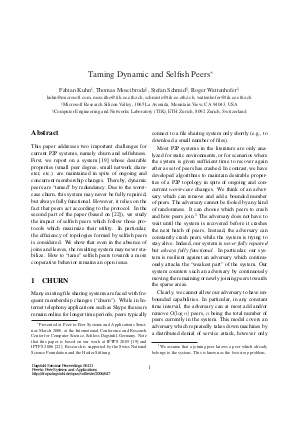Taming Dynamic and Selfish Peers
Authors Stefan Schmid, Fabian Kuhn, Thomas Moscibroda, Roger Wattenhofer
-
Part of:
Volume:
Dagstuhl Seminar Proceedings, Volume 6131
Part of: Series: Dagstuhl Seminar Proceedings (DagSemProc) - License:
 Creative Commons Attribution 4.0 International license
Creative Commons Attribution 4.0 International license
- Publication Date: 2006-12-15
File

PDF
DagSemProc.06131.5.pdf
- Filesize: 278 kB
- 14 pages
Document Identifiers
Subject Classification
Keywords
- Churn
- Selfishness
- P2P Topologies
Metrics
- Access Statistics
-
Total Accesses (updated on a weekly basis)
0Document
0Metadata
Abstract
Peer-to-peer systems are often faced with the problem of frequent membership changes. However, many systems are only proven efficient or correct in static environments. In my talk, I will present techniques to maintain desirable properties of a distributed hash table (low peer degree, low network diameter) in spite of ongoing and concurrent dynamics. I will then go on and study the effect of peers not acting according to our protocols. Concretely, I assume that peers are selfish and choose the behavior which maximizes their utility. I will report on our results concerning the impact of selfishness on the peer-to-peer topology.
Cite As Get BibTex
Stefan Schmid, Fabian Kuhn, Thomas Moscibroda, and Roger Wattenhofer. Taming Dynamic and Selfish Peers. In Peer-to-Peer-Systems and -Applications. Dagstuhl Seminar Proceedings, Volume 6131, pp. 1-14, Schloss Dagstuhl – Leibniz-Zentrum für Informatik (2006)
https://doi.org/10.4230/DagSemProc.06131.5
BibTex
@InProceedings{schmid_et_al:DagSemProc.06131.5,
author = {Schmid, Stefan and Kuhn, Fabian and Moscibroda, Thomas and Wattenhofer, Roger},
title = {{Taming Dynamic and Selfish Peers}},
booktitle = {Peer-to-Peer-Systems and -Applications},
pages = {1--14},
series = {Dagstuhl Seminar Proceedings (DagSemProc)},
ISSN = {1862-4405},
year = {2006},
volume = {6131},
editor = {Anthony D. Joseph and Ralf Steinmetz and Klaus Wehrle},
publisher = {Schloss Dagstuhl -- Leibniz-Zentrum f{\"u}r Informatik},
address = {Dagstuhl, Germany},
URL = {https://drops.dagstuhl.de/entities/document/10.4230/DagSemProc.06131.5},
URN = {urn:nbn:de:0030-drops-6477},
doi = {10.4230/DagSemProc.06131.5},
annote = {Keywords: Churn, Selfishness, P2P Topologies}
}
